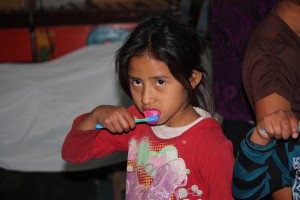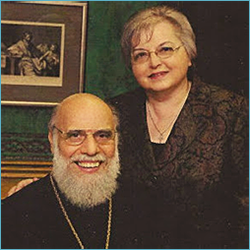While construction for the medical/dental clinic in the Mayan village of Aguacate was underway, a dental team headed by Dr. Willie Manteris, and including his daughter Nikki and Robert Kirschner arrived on August 10th. Their plan was to offer fluoride treatment, dental screening and treatment of the most serious types of conditions. Dr. Manteris began the dental hygiene class for 300 children, grades 4 through 6, explaining the effects of bacteria on their teeth. Disclosure tablets were then distributed to several of the children to show how much bacteria was on their teeth. The children reacted with much surprise and mirth when the tablets turned the bacteria on their teeth a bright red. They were then given toothbrushes and taught the proper way to brush their teeth. This was followed by a fluoride rinse treatment program, which the newly-trained community health worker (CHW) will administer in the village school each week thereafter. The cost of this fluoride treatment, which will significantly reduce the bacteria causing tooth decay, is 25 cents a year per person. Later on, the team was gratified to see the small children showing their parents the proper way to brush their teeth.
In addition to the fluoride treatment clinic for children, during the next three days, Dr. Manteris screened and treated over 150 patients, young and old. He extracted 133 teeth, removed dead, damaged and infected tissue (debridements), and gave antibiotics to those suffering infections from previous extractions. The youngest patient was a three year old boy, who required four extractions of primary teeth that were decayed down to the gum line. One of the CHWs, Juana, a 19 year old Mayan woman, observed and assisted with the extractions. She also proved invaluable as a translator, being fluent in both Spanish and the Chuj dialect of her tribe. As part of her training exercise, she was given medical health literature to study, for which she was very grateful. It must be remembered that the people in this and many other surrounding villages have little or no access to professional medical care. While at the village, samples of the drinking water at 3 natural, untreated springs, and from the large treated storage tank feeding the whole village, were collected for analysis by Microbac Laboratories in Pittsburgh. The pre-treated spring water contained unacceptable levels of both Coliform and E. coli (USEPA standards). The post-treated sample did not contain E.coli, but the Coliform level was unacceptable. These preliminary results suggest that the village water supply may be the cause of the stomach problems that many of the villagers complained of in a previous survey. What is next? Plans are in the works for several more medical mission trips, even while the clinic is under construction. A number of serious inquiries have been received from health professionals, some of whom are even considering long-term service. Of course, availability of medical resources and qualified personnel will determine our future course. Right now, pre-natal care and child wellness, as well as continuing dental care, stand out as immediate priorities. It is our hope and prayer that this important and life saving work will bear much fruit for the benefit of these humble people and redound to the glory of God.





Dr. Manteris, What a wonderful ministry! Thank God for your services to this Mayan community!
It’s an inspiration to hear and see the work you all do. I am a Guatemalan raised in the states, and I haven’t had the opportunity to return yet. But when I do, I plan to help the poverty communities with dental treatment.
Thank you for helping my people